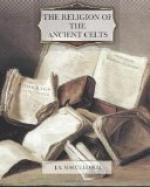[285] RC xii. 65. Elsewhere three supreme “ignorances” are ascribed to Oengus (RL xxvi. 31).
[286] RC iii. 342.
[287] LL 11_c_; LU 129; IT i. 130. Cf. the glass house, placed between sky and moon, to which Tristan conducts the queen. Bedier, Tristan et Iseut, 252. In a fragmentary version of the story Oengus is Etain’s wooer, but Mider is preferred by her father, and marries her. In the latter half of the story, Oengus does not appear (see p. 363, infra). Mr. Nutt (RC xxvii. 339) suggests that Oengus, not Mider, was the real hero of the story, but that its Christian redactors gave Mider his place in the second part. The fragments are edited by Stirn (ZCP vol. v.).
[288] HL 146.
[289] See my Childhood of Fiction, 114, 153. The tale has some unique features, as it alone among Western Maerchen and saga variants of the “True Bride” describes the malicious woman as the wife of Mider. In other words, the story implies polygamy, rarely found in European folk-tales.
[290] O’Grady, TOS iii.
[291] RC i. 41.
[292] O’Curry, MC i. 71.
[293] LL 117_a_. See p. 381, infra.
[294] Cumont, RC xxvi. 47; D’Arbois, RC xxvii. 127, notes the difficulty of explaining the change of e to i in the names.
[295] HL 121.
[296] See Crooke, Folk-Lore, viii. 341. Cf. Herod, ii. 131.
[297] Loth, i. 269.
[298] HL 563.
[299] Train, Isle of Man, Douglas, 1845, ii. 118; Grimm, Teut. Myth. ii. ch. 24; Frazer, GB{2} ii. 99 f.
[300] Bathurst, Roman Antiquities at Lydney Park, 1879; Holder, s.v. “Nodons.”
[301] See Rh[^y]s, HL 122; Cook, Folk-Lore, xvii. 30.
[302] Stokes, US 194-195; Rh[^y]s, HL, 128, IT i. 712.
[303] Loth, ii. 235, 296. See p. 160, infra.
[304] Joyce, OCR.
[305] For these four Manannans see Cormac 114, RC xxiv. 270, IT iii. 357.
[306] O’Grady, ii.
[307] Bodley Dindsenchas, No. 10, RC xii. 105; Joyce, SH i. 259; Otia Merseiana, ii. “Song of the Sea.”
[308] LU 133.
[309] Moore, 6.
[310] Geoffrey, Vita Merlini, 37; Rees, 435. Other saintly legends are derived from myths, e.g. that of S. Barri in his boat meeting S. Scuithne walking on the sea. Scuithne maintains he is walking on a field, and plucks a flower to prove it, while Barri confutes him by pulling a salmon out of the sea. This resembles an episode in the meeting of Bran and Manannan (Stokes, Felire, xxxix.; Nutt-Meyer, i. 39). Saints are often said to assist men just as the gods did. Columcille and Brigit appeared over the hosts of Erin assisting and encouraging them (RC xxiv. 40).




